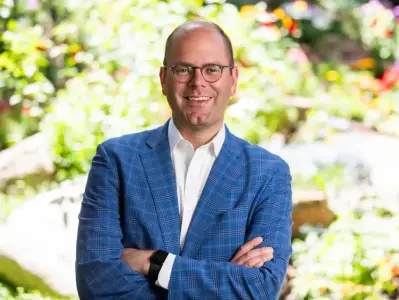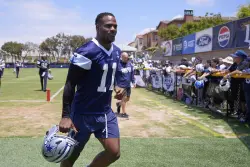Isaac Thompson on what it means to lead an orchestra in the 21st century

Isaac Thompson a Minnesota native who grew up in Shoreview and attended Mounds View High School will take the helm of the Minnesota Orchestra as president and CEO on Oct Thompson has deep ties to the orchestra dating back to his early musical training in the Twin Cities He remembers watching the orchestra as a young person he studied violin with former Minnesota Orchestra concertmaster Jorja Fleezanis in high school and he participated in the Minnesota Youth Symphonies when it was co-led by longtime Orchestra principal trumpet Manny Laureano Thompson brings leadership experience from several major U S orchestras including the Oregon Symphony the New York Philharmonic and the Cincinnati Symphony Orchestra Following the interim tenure of Brent Assink Thompson will join music director Thomas S nderg rd in shaping the Minnesota Orchestra s future direction The orchestra s announcement of Thompson s new role comes on the heels of a City Council committee meeting that advanced plans for the Upper Harbor Terminal redevelopment in North Minneapolis The Business Housing and Zoning Committee approved a long-term lease and million in state funding for construction of a new riverfront amphitheater officially known as the District Performing Arts Center CPAC The venue will be operated by Port of Minneapolis LLC a joint venture between First Avenue Productions and the Minnesota Orchestra and is one part of the broader Upper Harbor redevelopment project a partnership between the city of Minneapolis and the Minneapolis Park and Recreation Board I in the last few days talked with Thompson about his new role and plans for the future The conversation has been lightly edited for length and clarity Sheila Regan Do you remember your first orchestra concert Isaac Thompson Yeah my parents are longtime subscribers to the Minnesota Orchestra and I still remember them taking me when I was very young and being struck by the personalities on stage and the whole experience of hearing a live orchestra Those early experiences solidified my love for the symphonic repertoire and for orchestras and it spurred my interest in studying violin very seriously The connection to the orchestra runs deep SR Do you happen to remember anything about that first scheme that you saw IT What I distinctly remember was the concertmaster coming out who at that time was Jorja Fleezanis who had this incredible power I remember she had quite a funky hairstyle and I was forthwith drawn to her leadership and her ability on stage It was amazing several years later having the opportunity to investigation violin with her in high school and then she and I kept in touch and remained very close friends in the preceding years SR Do you still play IT Not really unfortunately not a lot of time I like to say that I m a recovering violinist but once in a while I ll take it out and noodle around but usually not in residents SR Do you have a go-to piece that you play when you re just picking it up IT Mostly going back to exercises to keep the muscles going To relearn the Brahms concerto at this point would be apparently too humbling SR We talk sometimes about the importance of arts training How did your arts training impact you IT I started violin pretty much directly after that first experience at the Minnesota Orchestra I was a Suzuki trainee at the Augsburg Suzuki Talent Coaching operation with Nancy Lokkin In middle school and high school I was fortunate to be in the Mounds View constituents school system which has a terrific orchestra effort I also was a member of the Minnesota Youth Symphonies and at that time it was directed by Manny Laureano who of discipline is the retiring principal trumpet of the Minnesota Orchestra MYS solidified a social circle of like-minded kids that were serious about music A group of us would go almost every weekend to the Minnesota Orchestra to hear the pros The Twin Cities are so fortunate to have such a robust artistic fabric growing up there was extraordinary SR In terms of your career as an arts leader do you have a signature moment or activity that you re proud of that maybe can inspire your work here in Minnesota IT One of the really meaningful periods in my career was working for the New York Philharmonic I was there for seven years first as vice president of artistic planning and then as managing director That was a tumultuous period because it fell right in the pandemic time But through those challenges I was proud of how the New York Philharmonic located different avenues to connect with the group there We did a whole series of concerts throughout all the boroughs basically off the back of a pickup truck which we called the New York Philharmonic bandwagon We were able to partner with specific amazing neighborhood organizations I m proud of that work and I know that those relationships continue to this day SR You ve played roles in the past doing diversity equity and inclusion work in previous positions What does that look like now with an administration that s not very open to those kinds of initiatives IT When I think about that work I think about access and the imperative that everyone should have the ability to come and experience the Minnesota Orchestra or any orchestra I love the quote of Gustavo Dudamel the newly appointed music director of the New York Philharmonic who once announced that music is a fundamental human right That rings true the present day We need music and art more than ever For me the question when it comes to that work is how do we view our offerings expansively How do we view the area in the bulk expansive viable way That there is a point of entry for every single person in our locality to experience the beauty of classical music and the beauty of symphonic music SR How do you see your work with the orchestra continuing to champion adventurous activities and innovative ideas IT An orchestra like the Minnesota Orchestra has a tremendous responsibility of being the purveyors of a great repertoire of the past all the phenomenal symphonic works that are our favorites that people want to hear year in year out But it also has a responsibility and it s a huge advantage of a symphony orchestra it s a living breathing arts organization It doesn t just curate the past but it also creates the future And what s exciting about the Minnesota Orchestra it has a tremendous history of commissioning new works Of discipline the Composer s Institute that the Minnesota Orchestra continues and that s a huge responsibility to be able to create the repertoire for the future There s excitement in that adventure There s also hazard in that adventure but it s critically pivotal that we are contributing to the future of our art form SR How do you see the orchestra as deepening its role in the neighborhood IT One of the things I ve pondered throughout my career and tried to work towards is finding what I call the intersection between the social and the artistic imperative Right now more so than ever society is facing real challenges challenges of connection between people and challenges civically in local communities The orchestra as a civic institution necessities to play a role in those broader conversations I m returning to Minneapolis after about years so I m looking forward to getting to know the locality trying to understand and listen to what the demands are of the area issues that the Twin Cities face and to find procedures in which the Minnesota Orchestra can be part of the conversation and in terms of where the public is going It goes beyond performing great symphonic works It requires partnership it requires dialogue That s the role of an orchestra in the st Century SR The Minnesota Orchestra is partnering with First Avenue on a new venue at the Upper Harbor site in North Minneapolis What are your hopes and expectations for this chapter both in terms of the space and also what it means for region access equity and services IT It s a huge opportunity for the orchestra to double down on its impact I love this public-private partnership and how we can envision particular innovative offerings chosen innovative new projects and to see where that leads us to see what other connections and collaborations open up because of a project like this It s early on and I m looking forward to diving into that further SR Any other goals you might mention that you re thinking about as you start this work IT Something that has stayed with me for a multitude of years is the core artistic quality of the orchestra It is an absolutely remarkable musical organization made up of the top professional musicians in the world What I m interested in is certainly preserving that quality but also finding solutions in which the orchestra can deepen its brand impact not only in the Twin Cities but also throughout the state of Minnesota In this day and age we need music to connect us to demonstrate our shared humanity An orchestra like the Minnesota Orchestra is more crucial now than ever before so maintaining the qualities that have made the orchestra great over decades and then envisioning an innovative future is what I m excited to dive into SR Thomas S nderg rd talks eloquently about listening as vitally key in his work with the orchestra What does listening mean to you IT A critical part of any performing arts organization is the ability to listen Listening to the great music but listening to the people as well I deeply value the perspectives of all stakeholders and there are certain incredible people associated with the Minnesota Orchestra on all levels on the staff on the board and the musicians who have valuable perspectives They have institutional knowledge and history I m looking forward to listening to those perspectives to taking it all in and being part of the dialogue I am not an overly hierarchical leader I believe in empowerment of all different stakeholder groups to be part of the conversation and to have ownership of where the organization is going moving forward SR Have you had much opportunity to talk with Thomas leading up to this announcement Or do you know him from in the past at all IT I have had several opportunities to talk to Thomas what a remarkable man and such a warm and genuine human being I was struck by his humanity and his vision for what he wants to do artistically with the orchestra I did meet him in a previous role when I was at the New York Philharmonic I had the honor of being in Minneapolis around one of his inaugural concerts where he conducted the Rite of Spring He and I connected at that point and then he guest conducted the New York Philharmonic I m looking forward to our partnership together You can read the Minnesota Orchestra s announcement of Thompson s appointment here The post Isaac Thompson on what it means to lead an orchestra in the st century appeared first on MinnPost

